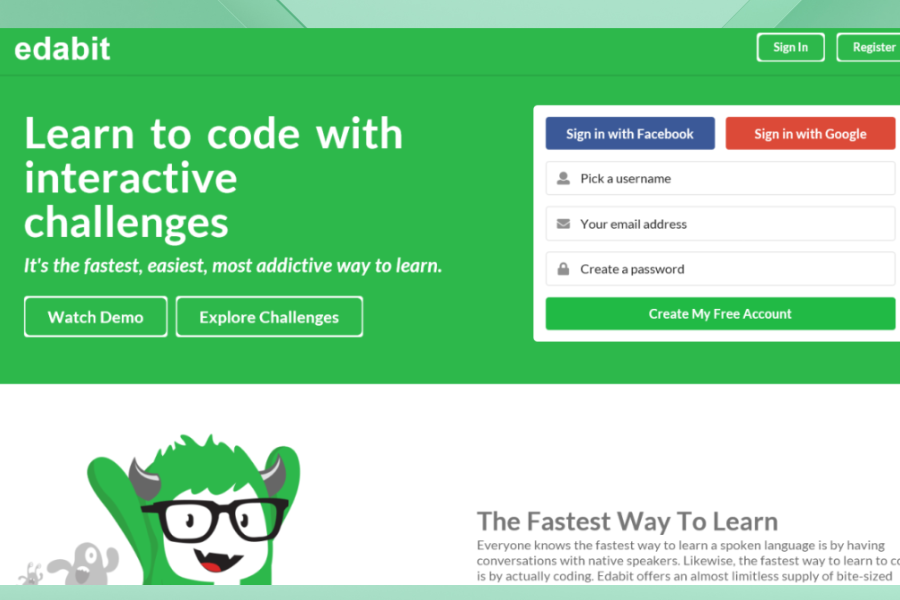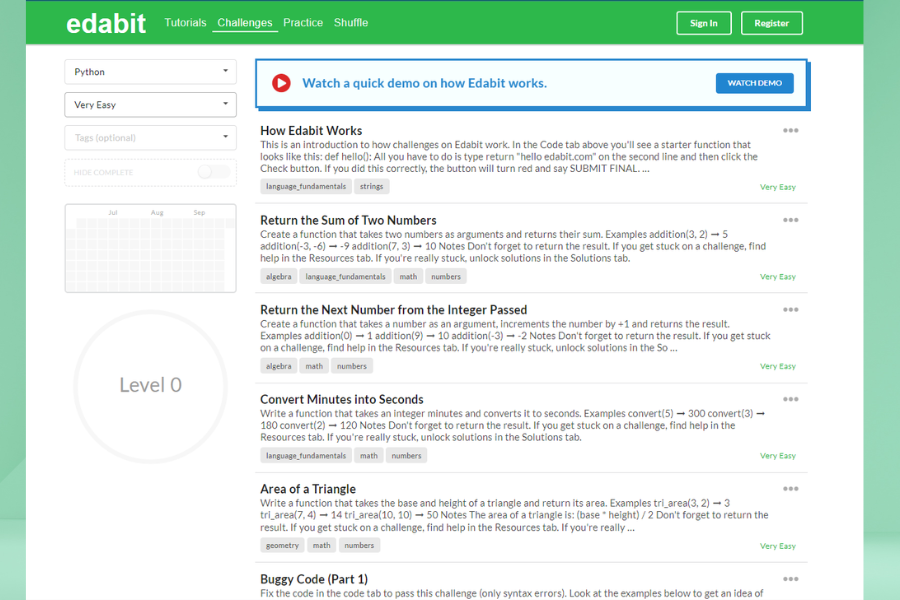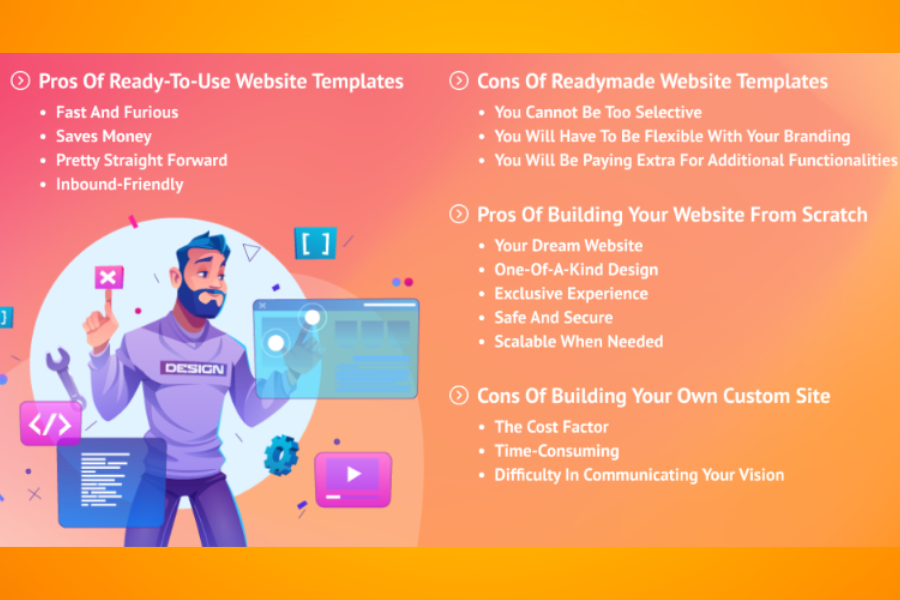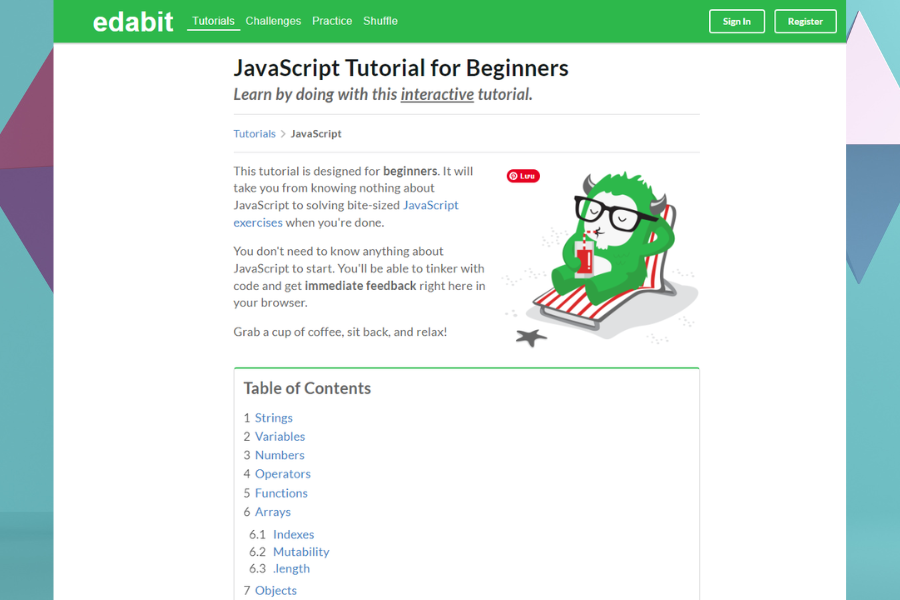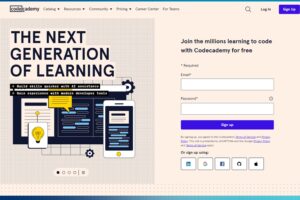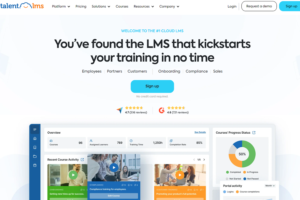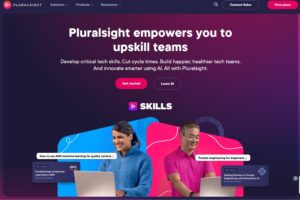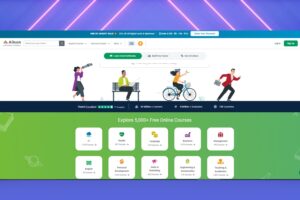Table of Contents
ToggleAbout edabit
Edabit is an interactive online platform designed to help users improve their coding skills through gamified coding challenges. It caters primarily to beginner and intermediate programmers, offering a vast collection of over 10,000 coding problems across eight programming languages, including Python, JavaScript, and C++.
Key Features of Edabit
- Extensive Challenge Library: Edabit provides coding challenges that range in difficulty from very easy to expert. This allows users to progress at their own pace and tackle problems that match their skill level.
- Gamification Elements: Users earn experience points (XP) for completing challenges, which helps them unlock achievements and level up. This gamified approach makes learning engaging and motivating.
- Built-in Code Editor: The platform includes an integrated code editor, allowing users to write and test their code directly on the site without needing to switch to another application.
- Community and Resources: Each challenge comes with resources, solutions, and comments from other users, fostering a collaborative learning environment. Users can also create their own collections of challenges to focus on specific skills.
- Free Access with Limitations: While Edabit is free to use, users can only complete a limited number of challenges (up to 15) before needing to subscribe for continued access. The subscription is relatively affordable, especially with discounts for annual plans.
Target Audience
Edabit is particularly beneficial for:
- Beginner Programmers: Those new to coding can start with very easy challenges to build foundational skills.
- Intermediate Learners: Users looking to enhance their problem-solving abilities and learn new programming languages can find valuable resources and challenges.
- Software Engineers Preparing for Interviews: Although not specifically designed for interview preparation, Edabit can help users practice algorithms and data structures relevant to technical interviews.
Pros
- Large variety of coding challenges.
- Engaging and motivating user experience.
- Free access to basic tutorials and challenges.
- Community support through comments and shared solutions.
Cons
- Limited advanced tutorials; more experienced coders may find the content basic.
- No formal certification for completed challenges, which may be a drawback for some learners.
- Lacks a structured learning path for interview preparation compared to some other platforms.
Overall, user reviews of Edabit are positive, highlighting its effectiveness for beginners and the enjoyable learning experience it provides. Many users appreciate how it helps bridge the gap between understanding syntax and applying programming logic in problem-solving scenarios. Some users have noted that while it is excellent for practice, it may not fully prepare them for specific coding interviews or advanced topics.
For beginners, Edabit provides a clear starting point and makes learning less intimidating. The challenges are designed to gradually increase in complexity, ensuring learners can advance at their own pace. For experienced developers, Edabit offers a platform to practice, stay sharp, and explore new languages or topics they may not use in their day-to-day work.
In summary, Edabit is a valuable resource for anyone looking to improve their coding skills through hands-on practice in a fun and interactive way.
How effective is Edabit for advanced programmers
Edabit can be a useful tool for programmers at various skill levels, but its effectiveness for advanced programmers is somewhat limited depending on their specific needs and goals.
Advantages of Edabit for Advanced Programmers
-
Practice and Problem Solving: Edabit offers a large selection of coding challenges, which can still be beneficial for experienced programmers who want to keep their skills sharp. The platform allows you to work on a range of problems that cover algorithms, data structures, and other core programming concepts. For advanced users, this can be a good way to maintain coding fluency and think through different types of problems quickly.
-
Language Variety: Edabit supports a variety of programming languages, so it could be useful for advanced programmers looking to pick up a new language or enhance their skills in a less familiar one. The ability to work on basic to intermediate tasks in a new language could speed up the learning process.
-
Gamified Experience: The platform offers a gamified experience with rewards and progression, which can be motivating even for seasoned programmers. This structure can make coding practice feel more engaging, keeping motivation high during regular practice sessions.
-
Speed and Efficiency: The shorter challenges can help advanced programmers improve their speed and efficiency in solving common algorithmic problems, which is useful for technical interviews or competitive programming.
Limitations for Advanced Programmers
-
Challenge Depth: Most challenges on Edabit are not designed with advanced-level programmers in mind. If you’re already proficient in complex algorithms and data structures, you may find many of the problems too easy. The platform focuses more on basic to intermediate problems, so it lacks the depth and complexity that other platforms like LeetCode or Codeforces offer for advanced users.
-
Algorithmic Rigor: For advanced programmers working on high-level algorithms or preparing for top-tier technical interviews at companies like Google or Facebook, Edabit may not offer the level of rigor needed. More advanced topics like dynamic programming, graph theory, or complex system design challenges are better explored on more specialized platforms.
-
No Real-World Projects: Edabit focuses mainly on small coding exercises rather than real-world coding projects. Advanced programmers who want to develop their skills through full-stack development, machine learning, or software architecture might not find Edabit as useful for progressing their career or building a portfolio.
-
Limited Community Engagement: Unlike some other coding platforms, Edabit does not have a large community for discussing advanced topics or offering mentorship. If you’re looking to engage with peers and tackle more challenging problems collaboratively, other platforms like HackerRank or Exercism might be better suited for that.
Recommendations for Advanced Programmers
-
LeetCode: For deeper algorithmic challenges and preparation for coding interviews, LeetCode offers a wide variety of problems that cater to advanced programmers.
-
Codeforces: A competitive programming platform that allows advanced programmers to participate in timed contests, which is great for improving algorithmic thinking under pressure.
-
HackerRank: Offers both algorithmic challenges and domain-specific exercises that can be beneficial for those working with specific languages or technologies.
In summary, Edabit can serve as a supplementary tool for advanced programmers looking to practice basic skills or refresh their knowledge in specific areas. However, for those seeking to tackle complex problems or prepare for technical interviews at a high level, platforms like LeetCode, Codewars, or HackerRank may be more suitable. Advanced users may find Edabit more beneficial as a fun, casual way to practice coding rather than a serious learning resource for skill advancement.
What is the main difference between Edabit and LeetCode?
Main Differences Between Edabit and LeetCode
Edabit and LeetCode are both popular platforms for coding practice, but they cater to different audiences and have distinct features. Here’s a comprehensive comparison of the two:
Target Audience and Skill Level
- Edabit: Primarily designed for beginners and intermediate coders. It offers a gamified experience with coding challenges that start from very easy and progress to expert levels. This makes it suitable for individuals who are new to programming or looking to solidify their foundational skills. Edabit encourages users to learn through small challenges and provides resources and solutions for each problem, making it accessible for those without prior coding experience.
- LeetCode: Aimed at software engineers and those preparing for technical interviews, LeetCode is more focused on algorithmic and data structure problems. It is particularly beneficial for users who have some coding experience and are looking to prepare for coding interviews at tech companies. LeetCode’s problems are often based on real interview questions, making it a critical resource for job seekers in the tech industry.
Problem Types and Complexity
- Edabit: Offers a wide variety of coding challenges across multiple programming languages, including Python, Java, and JavaScript. The challenges are categorized by difficulty, allowing users to gradually increase their skills. With over 10,000 problems, Edabit emphasizes practical coding skills and logic development rather than deep algorithmic knowledge.
- LeetCode: Features a vast repository of coding problems (over 3,200) that are specifically designed to test knowledge of algorithms and data structures. Problems are categorized into three levels: easy, medium, and hard, with a significant focus on preparing for technical interviews. LeetCode also includes company-specific questions, which are useful for targeted interview preparation.
Learning Approach
- Edabit: Utilizes a gamified approach where users earn points and unlock achievements as they solve challenges. This method encourages consistent practice and makes learning engaging. The platform also allows users to create collections of challenges based on specific topics, facilitating targeted learning.
- LeetCode: Focuses on a more traditional problem-solving approach, where users submit solutions to coding problems and receive immediate feedback on their correctness and efficiency. LeetCode also hosts contests and provides mock interviews, which simulate real interview conditions, enhancing the preparation experience for users.
Community and Resources
- Edabit: Has a community-driven aspect where users can contribute challenges and resources. This fosters a collaborative learning environment, making it easier for beginners to find help and resources tailored to their needs.
- LeetCode: Offers forums and discussion boards where users can engage with peers, share solutions, and discuss interview experiences. This community aspect is valuable for users seeking advice on specific problems or interview strategies.
In summary, Edabit is best suited for beginners looking to build their coding skills through simple challenges, while LeetCode is tailored for more experienced coders preparing for technical interviews with a focus on algorithms and data structures.
Can Edabit help learn a new programming language?
Edabit is an effective platform for learning a new programming language, particularly for beginners and those looking to enhance their coding skills through practical experience. Here are several reasons why Edabit can be beneficial for learning programming:
Interactive Learning Experience
Edabit offers a gamified approach to coding education, which encourages active engagement. Users tackle coding challenges that range from very easy to expert levels, allowing them to progressively build their skills. This hands-on experience is crucial for understanding programming concepts, as it fosters problem-solving abilities and reinforces learning through practice.
Variety of Programming Languages
The platform supports multiple programming languages, including Python, JavaScript, C++, Ruby, and more. This variety allows learners to explore different languages and find the one that suits their interests or career goals. With over 10,000 coding challenges available, users can practice and learn in a flexible manner, adapting to their own pace and preferences.
Immediate Feedback and Resources
Each challenge on Edabit provides immediate feedback, which is essential for learning. Users can see if their solutions are correct and can access resources to help them understand the concepts better. The platform also allows users to view solutions submitted by others, which can provide insights into different coding approaches and enhance learning.
Motivational Features
Edabit incorporates an XP and achievement system that motivates users to continue learning. As users complete challenges, they earn points and unlock achievements, creating a sense of progress and accomplishment. This gamified element can keep learners engaged and encourage them to set and achieve personal goals.
Supplemental Learning Tool
While Edabit is particularly beneficial for beginners, it can also serve as a supplemental resource for more advanced learners. Those who are already familiar with programming concepts can use the platform to refine their skills or learn new languages by solving specific challenges related to their interests.
Who Can Benefit from Edabit?
- Beginners: Ideal for individuals with no prior coding experience who want to learn the basics.
- Professionals: Useful for those in the workforce needing to automate tasks or improve their programming skills without committing to a full course.
- Students: A great supplement for those taking programming courses in school or college.
- Curious Learners: Anyone interested in programming who may have found other resources too overwhelming or unengaging.
In summary, Edabit is a valuable resource for anyone looking to learn a new programming language. Its interactive, gamified approach, combined with a wide range of challenges and immediate feedback, makes it an effective tool for developing coding skills.
How Edabit’s Gamification Approach Impacts Learning
Edabit employs a gamification approach that significantly enhances the learning experience for users, particularly those looking to improve their programming skills. This method integrates game-like elements into the educational process, which has been shown to boost engagement, motivation, and overall learning outcomes.
Key Aspects of Edabit’s Gamification Approach
Interactive Challenges
Edabit features a wide array of interactive coding challenges that cater to various skill levels, from beginners to advanced programmers. These challenges are designed to be bite-sized, allowing users to tackle them at their own pace. This structure helps learners gradually build their skills without feeling overwhelmed, which is crucial for maintaining motivation and engagement.
XP and Achievement System
One of the standout features of Edabit is its experience points (XP) and achievement system. As users complete challenges, they earn XP, unlock achievements, and level up. This gamified reward system fosters a sense of accomplishment and encourages continuous learning. Research indicates that such systems can significantly enhance motivation and engagement, as users are driven to achieve and progress through the platform.
Immediate Feedback
Edabit provides immediate feedback on coding challenges, allowing users to understand their mistakes and learn from them in real-time. This instant feedback loop is essential for effective learning, as it enables learners to correct errors and reinforce their understanding of programming concepts quickly.
Impacts on Learning
The gamification elements in Edabit lead to several positive outcomes for learners:
- Increased Engagement: By making the learning process fun and interactive, Edabit keeps users engaged. The competitive elements, such as leaderboards and achievements, create a stimulating environment that encourages users to participate actively in their learning journey.
- Enhanced Motivation: The gamified structure of Edabit helps maintain motivation over time. Users are more likely to return to the platform regularly to earn more XP and unlock new challenges, which leads to consistent practice and skill improvement.
- Improved Learning Outcomes: Studies have shown that gamification can lead to better academic performance and retention of information. The active participation required in solving challenges helps deepen understanding and enhances problem-solving skills, which are critical in programming.
- Social Connectivity: Gamification can also foster a sense of community among learners. Features like leaderboards encourage users to connect with peers, share achievements, and even collaborate on challenges, enhancing the social aspect of learning.
Edabit’s gamification approach effectively transforms the learning experience for aspiring programmers. By incorporating interactive challenges, an XP and achievement system, and immediate feedback, Edabit not only makes learning enjoyable but also significantly improves engagement, motivation, and learning outcomes. This innovative approach aligns well with contemporary educational strategies that emphasize active learning and user engagement, making Edabit a valuable resource for anyone looking to enhance their coding skills.
What advanced features does Edabit offer for experienced programmers?
Edabit offers several advanced features that cater to experienced programmers looking to enhance their skills through practical coding challenges. Here’s a detailed overview of what Edabit provides for those with more programming experience:
Advanced Features of Edabit for Experienced Programmers
Diverse Challenge Library
- Extensive Coding Challenges: Edabit boasts over 10,000 coding challenges across various programming languages, including Python, JavaScript, C++, and more. These challenges range from very easy to expert levels, allowing experienced programmers to select tasks that match their skill level and focus on specific areas of interest or weakness.
- Custom Collections: Users can create their own collections of challenges, grouping them by topics or themes. This feature is particularly useful for programmers who want to focus on specific skills or prepare for particular types of interviews.
Gamification and Progress Tracking
- XP and Achievement System: Edabit incorporates a gamified approach to learning, where users earn experience points (XP) and unlock achievements as they complete challenges. This system not only motivates users but also provides a clear visual representation of their progress and mastery of different topics.
- Immediate Feedback: Each challenge provides instant feedback, allowing users to learn from their mistakes and understand the correct solutions quickly. This feature is crucial for experienced programmers looking to refine their problem-solving skills without the delays often associated with traditional learning methods.
Skill Development and Specialization
- Focus on Algorithms and Data Structures: Edabit is particularly beneficial for programmers looking to strengthen their understanding of algorithms, logic, and data structures. The platform allows users to filter challenges by specific topics, making it easier to target areas that require more practice.
- Real-World Problem Simulation: The challenges are designed to mimic real-world programming scenarios, which helps users apply their knowledge practically. This aspect is essential for those preparing for technical interviews or looking to transition into more complex programming tasks.
Community and Resource Sharing
- User Contributions: Edabit is open-source, allowing users to contribute new challenges to the platform. This feature fosters a community-driven environment where experienced programmers can share their expertise and create challenges that reflect current industry standards.
- Resource Links and Discussions: Each challenge includes links to resources and solutions, as well as comments from other users. This collaborative aspect can enhance learning by providing different perspectives and approaches to problem-solving.
In summary, Edabit serves as a valuable tool for experienced programmers by offering a rich library of coding challenges, a motivating gamification system, and features that promote targeted skill development. These elements make it an effective platform for continuous learning and improvement in programming skills.
How Edabit Compares to Other Platforms for Advanced Coding Challenges
When it comes to learning to code, a variety of platforms offer challenges, tutorials, and exercises. For programmers at an advanced level, it’s crucial to choose the right platform to hone skills, practice problem-solving, and expand knowledge. Edabit is one of the platforms that provides coding challenges, but how does it stack up against other leading platforms like LeetCode, HackerRank, and Codewars for advanced coders?
Challenge Variety
- Edabit: Offers over 10,000 coding challenges across eight programming languages, ranging from very easy to expert levels. The challenges are designed to help users quickly improve their skills in algorithms, logic, and data structures. Users can filter challenges by specific topics, which is beneficial for focused learning.
- HackerRank: Provides a broader array of challenges, including over 1,000 tasks covering basic to advanced topics like artificial intelligence and security. It is particularly strong in preparing users for technical interviews, with simulated interview environments and competitions.
- LeetCode: Known for its extensive collection of algorithmic problems and data structure questions, LeetCode is a go-to platform for serious interview preparation. It offers over 1,900 problems, categorized by difficulty and topic, making it ideal for those targeting specific job roles in tech.
- Codewars: Focuses on creative problem-solving through “kata,” which are small coding exercises. The platform encourages community involvement, allowing users to propose challenges and solutions, which fosters a collaborative learning environment.
Community Engagement
- Edabit: Users can create profiles and earn points for solving challenges, but the community interaction is less robust compared to some other platforms. It does allow for comments and discussions on challenges, but lacks extensive social features.
- HackerRank: Boasts a large community of over 6 million developers, facilitating extensive interaction through forums, contests, and leaderboards. This community aspect can enhance motivation and provide support for learners.
- LeetCode: Has an active community where users discuss solutions and strategies, particularly for interview preparation. The platform also hosts regular contests, adding a competitive edge.
- Codewars: Highly community-driven, allowing users to create and solve challenges proposed by others. This interaction helps users learn from different approaches and solutions, enhancing the overall learning experience.
Language Support
- Edabit: Supports eight programming languages, including Python, JavaScript, and C++. This is sufficient for many learners, especially beginners looking to explore multiple languages.
- HackerRank: Offers support for over 50 programming languages, making it a versatile choice for users looking to practice in their preferred language or learn new ones.
- LeetCode: Also supports multiple languages, primarily focusing on those commonly used in technical interviews, such as Python, Java, and C++.
- Codewars: Supports a wide range of languages, allowing users to solve challenges in various programming environments, which can be beneficial for language-specific learning.
Career Advancement Opportunities
- Edabit: While it provides a solid foundation for beginners and intermediate coders, it lacks direct integration with job platforms or extensive employer visibility features. Its primary focus is on skill development rather than job placement.
- HackerRank: Actively used by companies for recruiting, offering a platform where developers can showcase their skills to potential employers. This feature is particularly advantageous for those seeking job opportunities.
- LeetCode: Similar to HackerRank, it is widely recognized in the tech industry for interview preparation. Many tech companies use LeetCode problems in their hiring processes, providing users with a competitive edge.
- Codility: Primarily focused on technical hiring assessments, Codility allows companies to evaluate candidates through coding challenges, making it a strong choice for job seekers looking to demonstrate their skills to potential employers.
For advanced coders, Edabit may not offer the depth and challenge needed to sharpen skills for competitive programming or technical interviews. While its clean interface and bite-sized challenges make it an excellent resource for beginners and intermediate users, platforms like LeetCode, HackerRank, and Codeforces are far superior when it comes to advanced algorithmic challenges, competitive programming, and interview preparation.
In summary, while Edabit is an excellent platform for beginners and those looking to improve their coding skills through a gamified experience, it may not be as comprehensive as other platforms like HackerRank or LeetCode for advanced coding challenges and career advancement. For those specifically targeting technical interviews or seeking extensive community engagement, platforms like HackerRank and LeetCode may provide greater value.
Ultimately, the right platform depends on your goals. If you’re aiming to push yourself with complex problems, prepare for interviews, or engage with a global coding community, LeetCode, HackerRank, and Codewars are better choices. However, if you’re looking for a more relaxed platform to reinforce your knowledge or teach others, Edabit still offers value.
How is Edabit’s problem solving approach different from LeetCode?
Edabit and LeetCode are both platforms designed to enhance coding and problem-solving skills, but they differ in their approach, difficulty levels, and target audiences. Here’s a breakdown of how their problem-solving approaches differ:
1. Target Audience and Difficulty Levels
- Edabit: Edabit is designed with beginners in mind. It offers a wide range of easy-to-medium challenges, making it more suitable for those who are just starting out in programming or those looking to practice fundamental coding skills. The platform provides straightforward problems that are often focused on building basic coding proficiency in languages like Python, JavaScript, and Java.
- LeetCode: LeetCode caters to a more advanced audience, particularly individuals preparing for technical job interviews at top tech companies. The problems on LeetCode tend to be more complex and are often based on real-world technical interview questions. The difficulty levels range from easy to hard, but even the easy problems may require more algorithmic thinking compared to Edabit.
2. Problem Structure and Complexity
- Edabit: Problems on Edabit are generally shorter and more concise. They focus on specific tasks or functions, helping users build a strong foundation in programming concepts. Many problems are designed to practice language syntax, basic data structures, and simple algorithms, which makes the platform more accessible for beginners and those looking to solidify basic coding skills.
- LeetCode: LeetCode’s problems are often more complex and involve deeper problem-solving skills. Many problems require advanced knowledge of data structures (e.g., trees, graphs, heaps) and algorithms (e.g., dynamic programming, backtracking). These problems frequently require a multi-step solution process, simulating the challenges faced in real-world coding and software development.
3. Learning Experience
- Edabit: Edabit provides a gamified learning experience, rewarding users with points and badges as they solve challenges. This keeps the learning process fun and engaging, especially for those who may be less motivated by more academic approaches. The focus is on writing quick, simple functions, and users can see incremental progress as they solve problems.
- LeetCode: LeetCode focuses more on preparing users for coding interviews. It offers detailed problem statements and typically requires users to develop more efficient solutions. Users are expected to optimize their code for time and space complexity. LeetCode also provides a discussion section where users can view solutions, explanations, and optimization techniques from other users, creating a more in-depth learning experience.
4. Competitive Environment
- Edabit: While Edabit does track user progress and has a leaderboard system, it is not as competitive as LeetCode. The platform is more focused on helping users improve their coding skills in a low-pressure environment.
- LeetCode: LeetCode fosters a highly competitive environment, with features like contests, company-specific problems, and global leaderboards. LeetCode users can participate in coding contests that simulate technical interviews in real time, offering a more intense, competitive learning atmosphere.
5. Application and Focus
- Edabit: Edabit’s main focus is on improving coding fluency through smaller, bite-sized challenges. It’s great for learners who want to reinforce their understanding of programming syntax, basic problem-solving techniques, and algorithmic thinking without delving into overly complex problems.
- LeetCode: LeetCode is heavily focused on job interview preparation. It offers problems that are similar to what you would encounter in a coding interview at companies like Google, Amazon, and Facebook. The platform even allows users to filter problems by company, making it a go-to resource for those aiming for tech jobs.
6. User Experience
- Edabit: Edabit offers a clean, simple interface that emphasizes ease of use and quick problem-solving. The platform is very beginner-friendly and offers immediate feedback on submissions. The problems are categorized by difficulty, and users can quickly jump from one problem to the next.
- LeetCode: LeetCode provides a more advanced interface with additional features such as test cases, solution comparisons, and a detailed discussion section. The problems can be filtered by difficulty, tags (such as data structures or algorithms), or by companies, making it easier for users to focus on specific areas of improvement.
In summary, Edabit is a more approachable platform for beginners looking to strengthen their programming skills with quick and simple problems, while LeetCode is designed for more advanced users who want to tackle complex algorithmic challenges and prepare for coding interviews. If you’re a beginner or want to practice basic concepts, Edabit is a great choice. If you’re preparing for a tech interview or seeking to sharpen your problem-solving skills with challenging tasks, LeetCode would be more suitable.
What unique features does Edabit offer that LeetCode doesn’t?
When comparing Edabit and LeetCode, both are coding platforms aimed at improving programming skills, but they cater to slightly different audiences and purposes. Here are the unique features that Edabit offers that LeetCode doesn’t:
1. Beginner-Friendly Approach
- Edabit is designed with beginners in mind, providing challenges that are much more accessible to those who are just starting out with programming. The platform offers “bite-sized” coding problems, with simpler and smaller problems in the early stages, making it easier to build foundational skills.
- LeetCode, while excellent for interview preparation, tends to be more advanced and focused on algorithms and data structures, which might be overwhelming for absolute beginners.
2. Instant Feedback and Gamification
- Edabit uses a gamified experience with instant feedback, where users can immediately see the results of their code. The platform encourages continuous learning through XP points, achievements, and a sense of progression that keeps learners engaged.
- LeetCode, though comprehensive in its explanations, doesn’t focus on gamification in the same way. While LeetCode does have a points system, it’s more geared toward competitive programming rather than engagement and learning incentives.
3. Simple, Casual UI
- The user interface of Edabit is minimalistic and clean, designed to make the platform approachable to casual learners who might feel intimidated by complex environments. It’s more about making coding fun, rather than an intense challenge.
- LeetCode’s UI is more feature-packed and designed for serious learners or those preparing for technical interviews, which may be daunting for those not aiming for high-stakes coding.
4. Community and Peer Learning
- While LeetCode has a very active community for competitive coding, Edabit fosters a more collaborative, beginner-focused environment where users can interact without the pressure of competitions. There’s a greater emphasis on helping each other learn rather than ranking high on leaderboards.
5. Problem Variety in Simplicity
- Edabit offers a wide range of simple problems that focus on improving core programming skills, making it more suitable for those who want to practice in a low-stress environment. It provides more everyday coding exercises to build up problem-solving abilities.
- On LeetCode, the problems often involve complex algorithms or data structures and are geared toward solving specific types of interview questions, which may not be as relevant for casual learners.
6. Educational Focus vs. Job Prep
- Edabit is more focused on the educational aspect of coding, allowing users to progress from basic to advanced levels at their own pace. It’s not as focused on preparing users for coding interviews.
- LeetCode, in contrast, is highly focused on job interview preparation, especially for tech companies. It has an extensive library of algorithm-based problems often used by companies in technical interviews.
7. Accessible Premium Features
- Edabit’s premium features, like access to more advanced challenges, are often priced more affordably, making them more accessible to casual learners. In contrast, LeetCode Premium is focused on giving users access to company-specific coding interview questions, which is more relevant for job hunters.
In summary, Edabit stands out for its focus on beginner-friendliness, gamification, and casual learning, while LeetCode is more suited for competitive programming and interview preparation. If someone is just starting their coding journey or looking for a more relaxed way to practice, Edabit offers a unique experience that’s different from LeetCode’s high-intensity environment.
What programming languages does Edabit offer? Pros and cons analysis
Edabit offers a variety of programming languages to cater to developers at different skill levels. Here’s a list of some of the programming languages you can find on Edabit, followed by a pros and cons analysis:
Programming Languages Offered by Edabit:
- Python
- JavaScript
- Java
- C++
- C#
- Ruby
- PHP
- Swift
- Go
- Kotlin
- R
- TypeScript
- Haskell
Pros and Cons Analysis:
1. Python
- Pros:
- Simple and readable syntax, ideal for beginners.
- Wide range of applications, from web development to data science.
- Extensive libraries and community support.
- Cons:
- Slower performance compared to compiled languages like C++ or Java.
- Not ideal for mobile or memory-intensive applications.
2. JavaScript
- Pros:
- Ubiquitous in web development.
- Runs in any modern browser, making it highly accessible.
- Rich ecosystem for front-end and back-end (Node.js) development.
- Cons:
- Can be challenging to learn for beginners due to asynchronous behavior.
- Security vulnerabilities in client-side scripting.
3. Java
- Pros:
- Highly portable due to JVM (Java Virtual Machine).
- Strong typing system reduces bugs.
- Popular in large-scale enterprise applications.
- Cons:
- Verbose syntax compared to modern languages like Python or Kotlin.
- Slower startup time due to JVM overhead.
4. C++
- Pros:
- High performance due to its compiled nature.
- Provides direct memory management, making it powerful for systems programming.
- Extensive libraries for game development, graphical applications.
- Cons:
- Complex syntax, steep learning curve.
- Difficult to manage memory and avoid bugs like segmentation faults.
5. C#
- Pros:
- Great for Windows applications and Unity game development.
- Strongly typed with powerful development tools in Visual Studio.
- Good balance of performance and ease of use.
- Cons:
- Primarily tied to the Microsoft ecosystem.
- Larger memory footprint compared to C++.
6. Ruby
- Pros:
- Elegant and readable syntax, good for beginners.
- Popular for web development (Ruby on Rails).
- Cons:
- Slower performance compared to other languages.
- Smaller community and fewer libraries outside of web development.
7. PHP
- Pros:
- Highly popular for web development, especially with WordPress.
- Simple and widely used for server-side scripting.
- Cons:
- Inconsistent syntax and function naming.
- Security vulnerabilities when not properly handled.
8. Swift
- Pros:
- Designed for iOS and macOS development, highly optimized for Apple’s ecosystem.
- Safer than Objective-C due to strong typing and optionals.
- Cons:
- Limited to Apple’s platforms.
- Smaller job market compared to other languages like Java or Python.
9. Go (Golang)
- Pros:
- Excellent for concurrent programming, ideal for cloud applications.
- Simple and easy-to-read syntax.
- Cons:
- Fewer libraries and frameworks compared to languages like Python or Java.
- Lack of generics can lead to repetitive code.
10. Kotlin
- Pros:
- Interoperable with Java, which makes it great for Android development.
- More concise and modern than Java.
- Cons:
- Newer language, so fewer learning resources.
- Fewer libraries and tools compared to Java.
11. R
- Pros:
- Designed for statistical computing and data visualization.
- Large collection of packages for data analysis.
- Cons:
- Steeper learning curve for general programming tasks.
- Slower compared to languages like Python when handling large datasets.
12. TypeScript
- Pros:
- Adds static typing to JavaScript, reducing runtime errors.
- Popular for large-scale applications, especially in front-end development.
- Cons:
- Requires a transpiler to convert to JavaScript, adding complexity to projects.
- Learning curve for developers not familiar with static typing.
13. Haskell
- Pros:
- Pure functional programming language, which ensures code reliability.
- Strong emphasis on immutability and functions as first-class citizens.
- Cons:
- Difficult to learn due to its functional paradigm.
- Limited job market and real-world applications.
Each language offered by Edabit comes with its strengths and weaknesses. The best language to learn depends on your goals—whether it’s web development, data science, game development, or mobile app creation. For beginners, Python and JavaScript are often the go-to languages due to their simplicity and wide range of applications. If you’re more interested in high-performance systems or enterprise applications, languages like C++, C#, or Java would be more suitable.
Which platform is better for beginners, Edabit or LeetCode
When choosing between Edabit and LeetCode for beginners in coding, both platforms have their strengths, but they cater to different needs. Here’s a comparison to help you decide:
1. Difficulty Level and Beginner-Friendliness:
- Edabit:
- Perfect for absolute beginners.
- Offers easier problems that start with basic concepts, making it ideal if you are new to programming.
- Focuses on a smoother learning curve by gradually increasing the complexity of the challenges.
- LeetCode:
- Aimed more at intermediate to advanced users, particularly those preparing for coding interviews at tech companies.
- Beginners might find the problems challenging as many focus on algorithms and data structures, often requiring a solid understanding of core concepts.
Verdict: Edabit is better for beginners looking for an accessible, step-by-step approach.
2. Problem Types:
- Edabit:
- Focuses on bite-sized, fun coding challenges. It’s excellent for practicing syntax, logical thinking, and small problem-solving tasks.
- You’ll find problems that encourage learning core programming concepts such as loops, conditions, and arrays.
- LeetCode:
- Focuses heavily on algorithmic problems and data structure challenges, which are essential for technical interviews.
- Problems are generally more complex, ranging from simple tasks to complex algorithmic challenges like dynamic programming, graphs, and trees.
Verdict: Edabit is more beginner-friendly, while LeetCode is better for learning advanced algorithms.
3. Learning Structure and Guidance:
-
Edabit:
- Provides clear and simple instructions with a gamified experience, which helps beginners stay motivated.
- Offers small rewards and achievements that make learning feel fun and less intimidating.
-
LeetCode:
- Provides a vast range of problems but with less hand-holding.
- Offers solutions and discussion boards, but the platform expects you to be more independent in problem-solving.
Verdict: Edabit offers more structured and guided learning for beginners.
4. Purpose:
-
Edabit:
- Designed for people learning to code and looking to build foundational skills.
- Not specifically aimed at preparing you for coding interviews, but rather for building programming fluency.
-
LeetCode:
- Tailored for those preparing for technical interviews, especially for large tech companies like Google, Facebook, and Amazon.
- You’ll find many interview-style problems similar to what’s asked in real-world coding interviews.
Verdict: If you’re looking to start learning coding, Edabit is better. If you’re aiming to prepare for interviews, LeetCode is the way to go.
5. Languages Supported:
- Edabit:
- Supports popular languages like Python, JavaScript, Java, C#, C++, and a few others.
- LeetCode:
- Supports a wider range of programming languages, making it suitable for advanced users who want to practice in various languages.
Verdict: LeetCode offers more variety, but for beginners, the options on Edabit are sufficient.
- For Beginners: If you’re just starting out and need a simple, engaging platform to learn core programming skills, Edabit is the better choice.
- For Interview Preparation: If you are a beginner but have a specific goal of preparing for coding interviews or advancing your algorithm skills, LeetCode would be the better long-term choice once you are more comfortable with the basics.
So, if you’re just starting your coding journey, Edabit is likely the platform that will help you build confidence and foundational knowledge.
Conclusion: Is Edabit the right choice for you?
When deciding whether Edabit is the right choice for you, it’s essential to weigh its features, target audience, and your specific learning needs. Here’s a breakdown to help you determine if Edabit fits your goals.
What is Edabit?
Edabit is an online platform designed to help users improve their coding skills through practice. It provides coding challenges across various languages, including Python, JavaScript, C++, Java, and many more. The platform’s focus is on offering an engaging and gamified approach to learning programming.
Who is Edabit best for?
-
Beginners and Intermediate Coders
If you are new to coding or looking to sharpen your skills, Edabit offers challenges that suit your level. The challenges are categorized by difficulty, making it easy to start from the basics and work your way up. Edabit allows you to develop problem-solving skills while learning syntax and language-specific concepts. -
People Who Prefer Hands-On Learning
Edabit is designed for those who learn best through active practice rather than theoretical instruction. By diving into coding problems, you can apply what you’ve learned immediately, which reinforces your understanding of core programming concepts. -
Gamified Learning Enthusiasts
If you enjoy a gamified experience where you earn points, badges, and rewards, Edabit will keep you motivated. The platform makes the learning process feel more like a game than a traditional classroom setting. -
Busy Learners with Limited Time
The platform offers bite-sized coding challenges that you can tackle in short bursts, making it an excellent option if you’re a working professional or student with limited time to dedicate to long lessons.
Pros of Edabit
-
Diverse Challenge Levels
Whether you’re a beginner, intermediate, or advanced coder, Edabit has challenges suited for your skill level. -
Variety of Programming Languages
You can practice in multiple languages, helping you become more versatile in your coding abilities. -
Engagement and Motivation
The points system and achievements make learning feel fun and engaging, keeping you motivated to continue. -
Affordable
Compared to some coding bootcamps and online courses, Edabit offers a budget-friendly way to enhance your coding skills.
Cons of Edabit
-
Lack of In-Depth Theoretical Learning
Edabit focuses more on problem-solving than teaching concepts. If you need comprehensive tutorials or theoretical knowledge to accompany your practice, you may want to supplement Edabit with other resources, like Codecademy or freeCodeCamp. -
Not Ideal for Structured Learning
Edabit’s self-paced and challenge-based model can be a downside if you prefer a more structured course with lectures, projects, and step-by-step guidance. -
Limited Feedback on Solutions
While Edabit allows you to submit code and see whether it works, the feedback on incorrect solutions is minimal. You won’t receive in-depth explanations on why a solution is wrong or what the best approach is.
Is Edabit Right for You?
Consider Edabit if:
- You enjoy learning by doing and practicing code challenges.
- You prefer an affordable and engaging way to improve your programming skills.
- You already have some foundational knowledge and want to level up through consistent practice.
However, Edabit may not be ideal if:
- You are a complete beginner who needs structured tutorials to grasp core concepts.
- You want extensive feedback and detailed explanations for every coding problem.
If you’re looking for a platform that offers plenty of coding challenges across multiple languages and helps build problem-solving skills through a gamified experience, Edabit is a strong choice. However, it works best when paired with other resources that provide a more thorough understanding of programming concepts and real-world applications.
In conclusion, Edabit.com is a unique and innovative learning platform that offers a gamified approach to coding challenges. With its extensive library of exercises and instant feedback, it provides an engaging and practical learning experience for individuals looking to improve their coding skills. While it may not cater to absolute beginners or offer a comprehensive learning experience, it is a valuable tool for active learners who enjoy hands-on challenges. Considering its reasonable pricing and positive user reviews, Edabit.com is definitely worth exploring for anyone interested in enhancing their coding abilities.
[CTA] Ready to level up your coding skills? Visit Edabit.com and start your free trial now!


